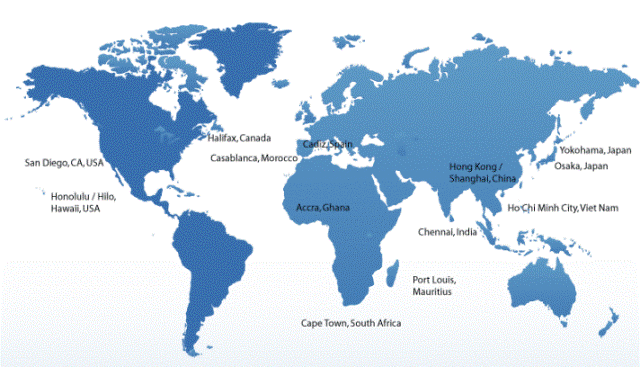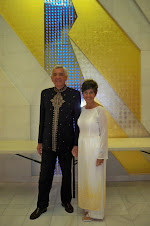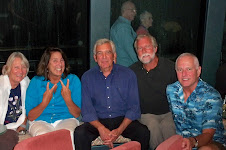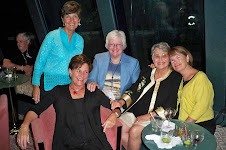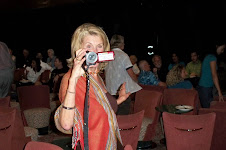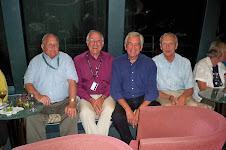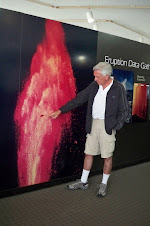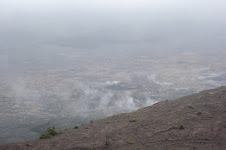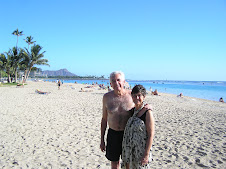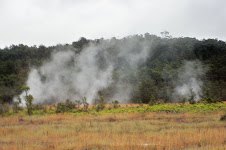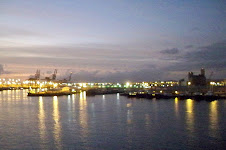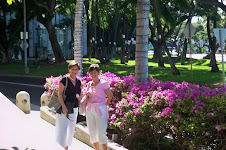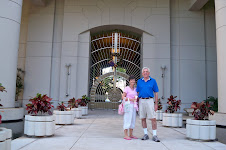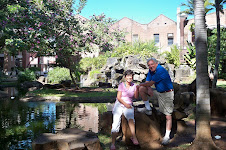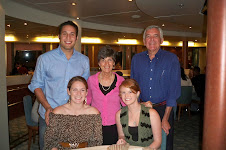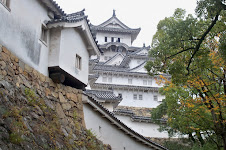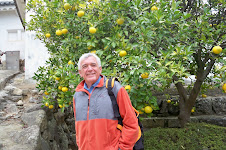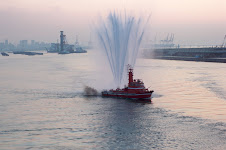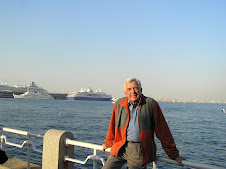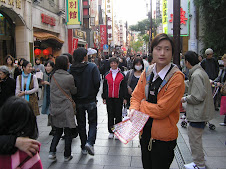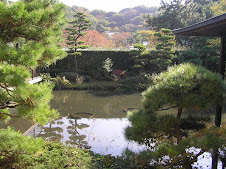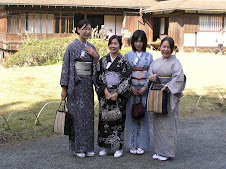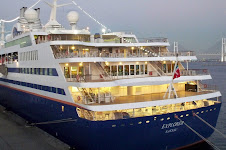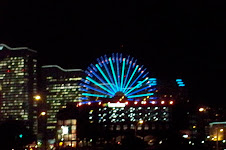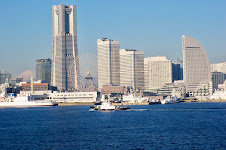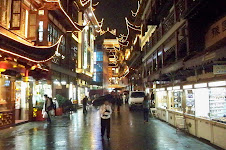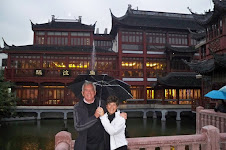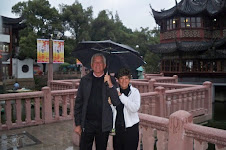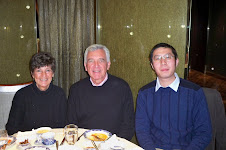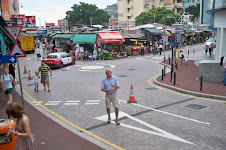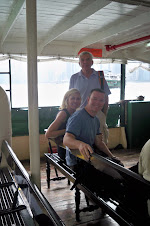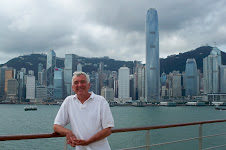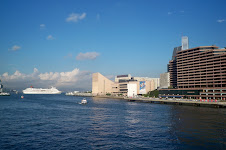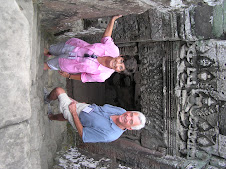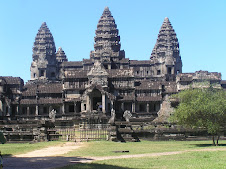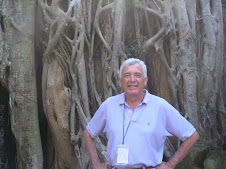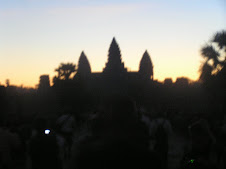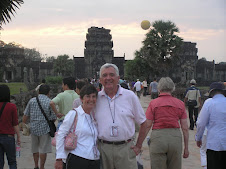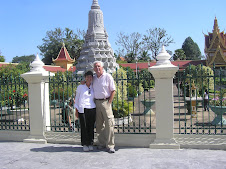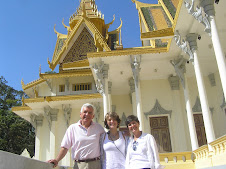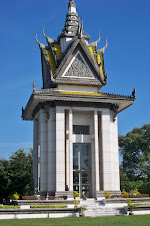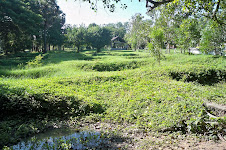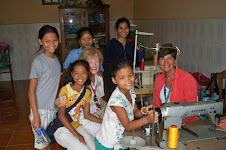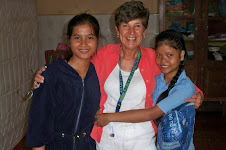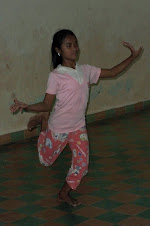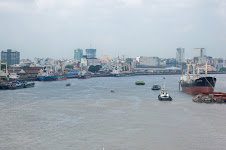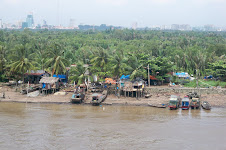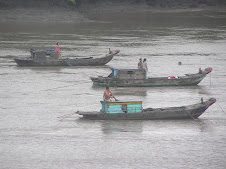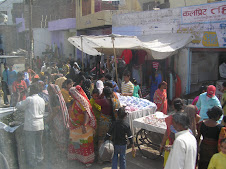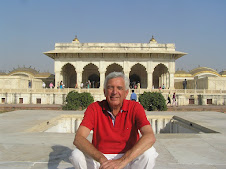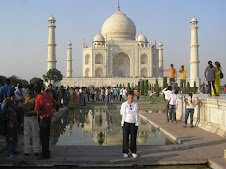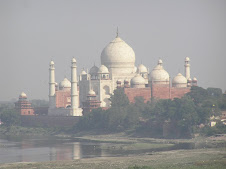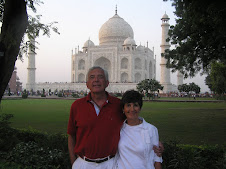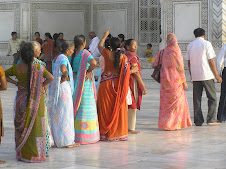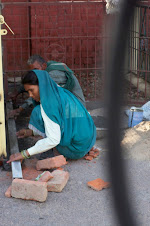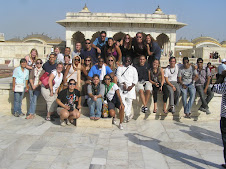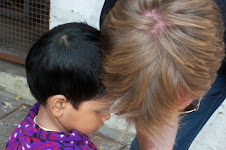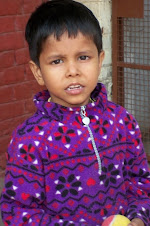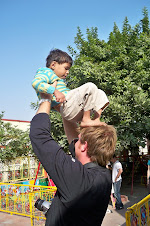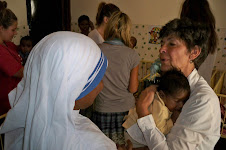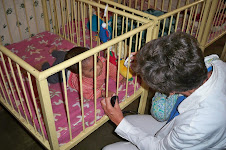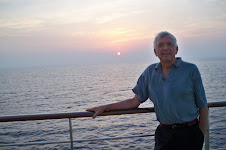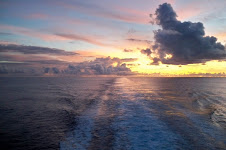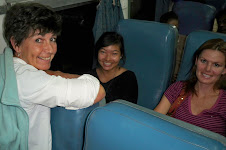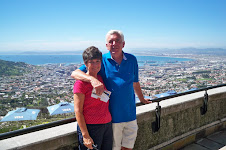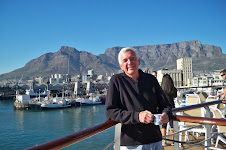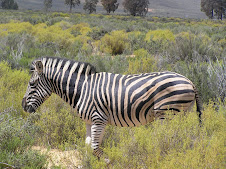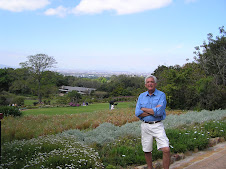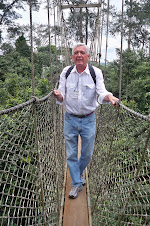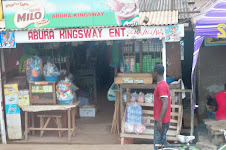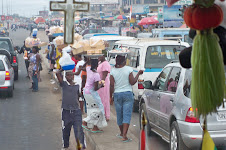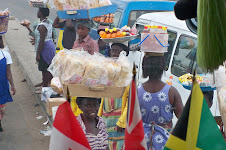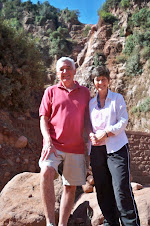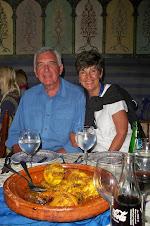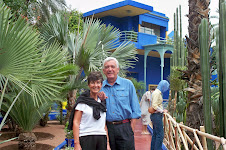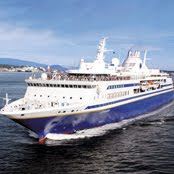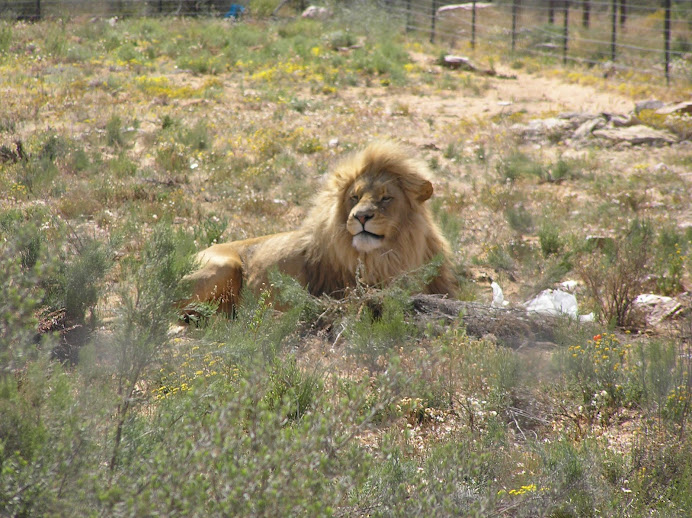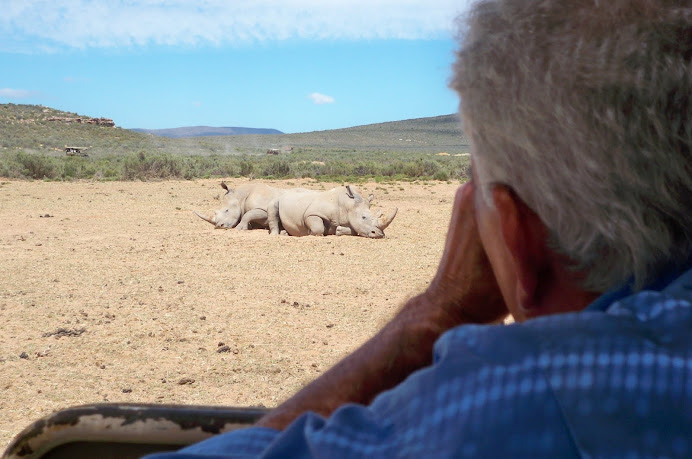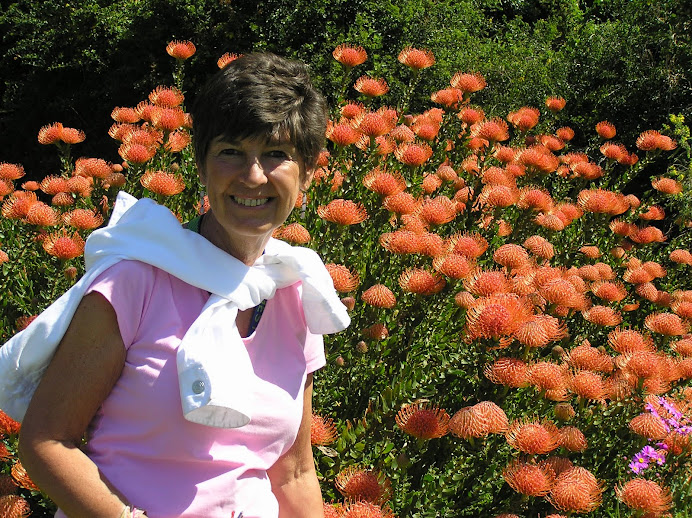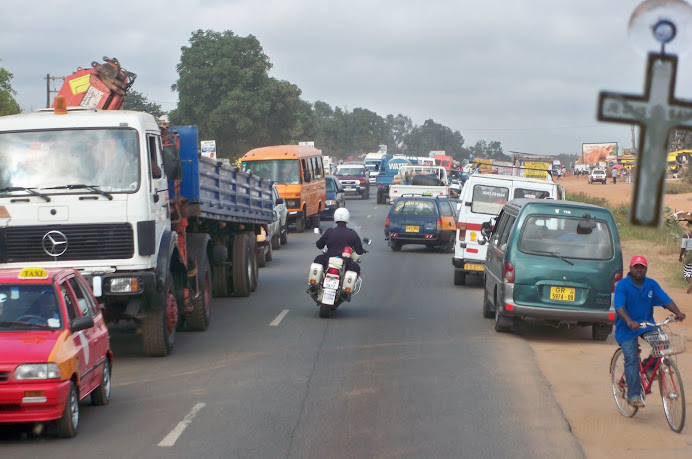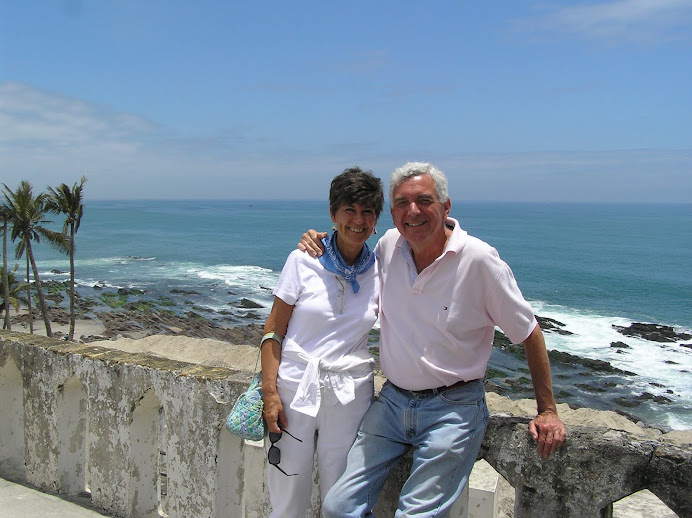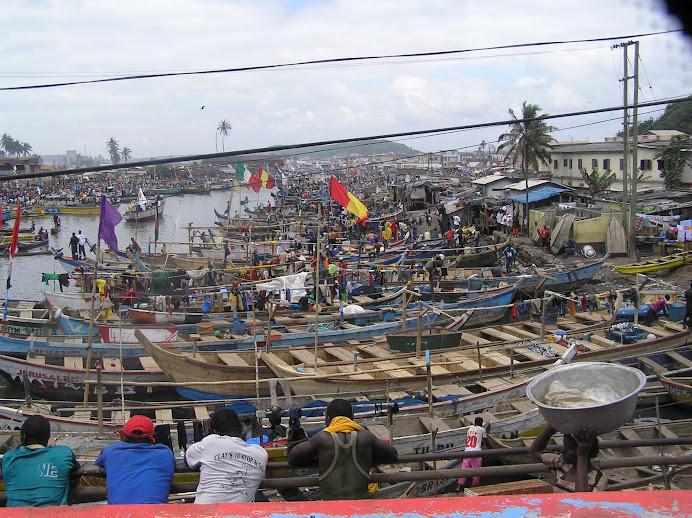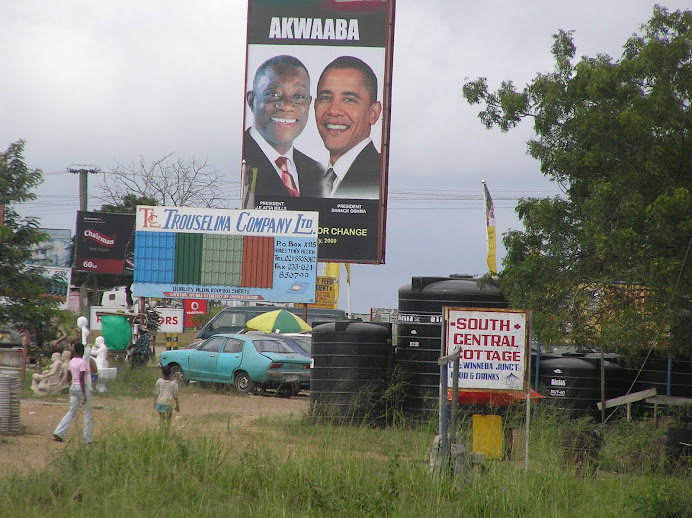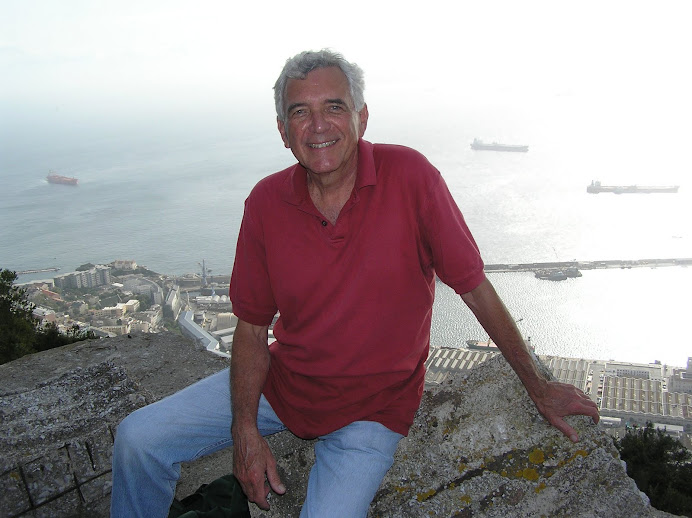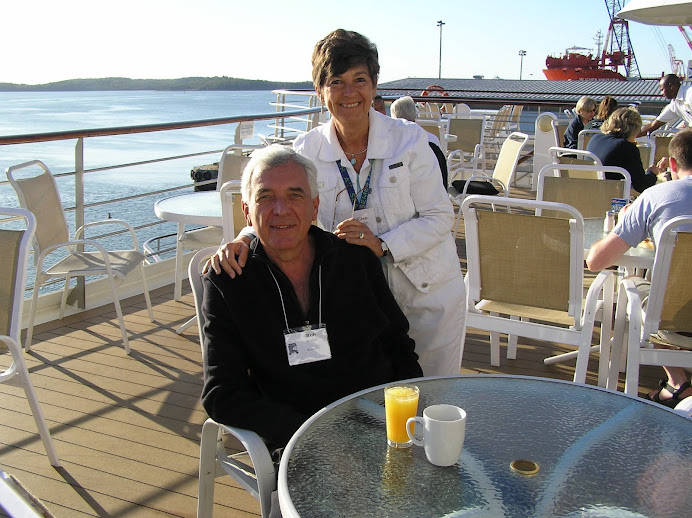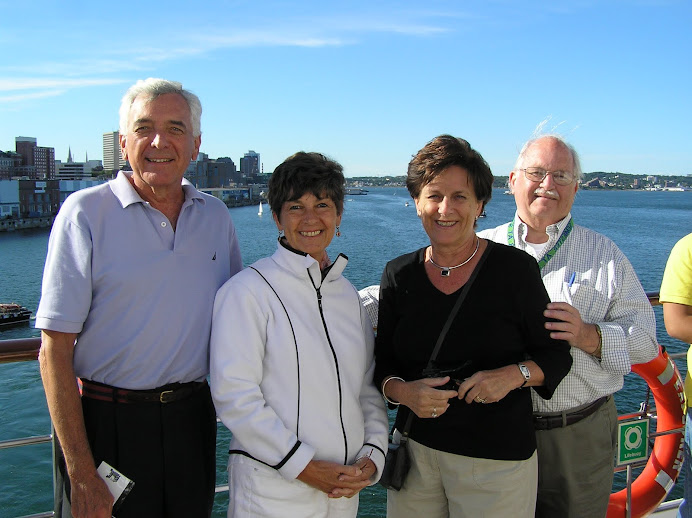Words are inadequate for me to describe how glad I am that I got to on the Semester at Sea Voyage.
I was always very busy with classes, pictures, mothering college students, the blog, new friends, fascinating new ports... Never once was I bored; but then, I have never, ever been bored.
None of us on the ship felt that we were on a "a cruise" or a "vacation". We were all learning about the places we visited, the history, geography, geology, languages, culture...We were involved in service projects. I loved working in one of Mother Teresa's orphanages, and another in Cambodia, talking with local people, hearing their stories, and their ancestor's stories. And then there are the markets...I had a ball in markets. I got a little addicted to markets. We paid full price without exception in the Townships near Cape Town where the grinding poverty is apparent every where we looked. In Shanghai, we bargained our heads off and actually gained the respect of the vendors by doing so. They would often grin and shake our hands at the end of negotiations.
Traveling on the MV Explorer put us in a warm, genial society of interesting and intelligent, not to mention well-educated(every professor had to have a terminal degree--mostly Ph.D.s), people. We grew to love one another. I will miss the mealtime conversations that went on far beyond the meal, the classes in which I learned from the world-class professors, and also learned from watching the students learn, and from seeing them grow intellectually. Much of what Rob and have lived through isn't even on the college students' radar as history. They thought we "won" the Viet Nam War. Many thought racism never was much of an issue in the South. Some had never heard of Pol Pot or even Ho Chi Minh, or Mao. By the end, we all knew more. The ports are where we went inland and saw that Man keeps making the same mistakes over and over, that slavery is inexcusable and still going on, that we are using up our resources, ruining our land and seas, that people are as alike as they are different, that great beauty and great kindness still exist along side evidence of man's inhumanity to man...
We came home to the snow storm of the century here in Charlottesville. I am glad we didn't miss it. Our next-door-neighbors, Doug and Allison Woodside, had an impromptu wine and hor s d' oeuvre party and we were all to bring what snack we had to share. Doug and Allison have frequently had spur of the moment neighborhood snow parties to which we all bring what we can find at home to share.The event was a wonderful reminder that our warm an careing ship community is much like the one we left in our very own neighborhood. I still miss the ship and our friends there, but at least I am not blind to the fact that I am part of other communities that are just as warm and careing.
While we were gone I sent my recently widowed Mother a play-by-play report on the trip by sending her letters after every port (15 of them)via e-mail to daughter Hailey who printed each letter as it arrived and mailed it to Mother (who is as computer phobic as a person can be). Then Mother mailed the letters on to her sister Harriet, one-by-one. They enjoyed visiting on the phone about them. Some of those letters are incorporated in this blog. I also sent a packet of photos via Kodak Easy Share to Mother after every port so she could see as well as read about our adventures each country.
Now I am thinking about going through letters to Mother, e-mail messages I sent from the ship, and this blog to put together a much more polished and complete report of our trip around the world on the MV Explorer. I want to tell the stories of some of the people on the ship, such as Milton, who has adopted a school in Ghana, and not only has he had it fixed up with carpentry and paint, and mailed back school supplies, but he has also inspired the students in Rob's non-profit leadership course to set up an actual foundation to support this and other schools in Ghana. As part of their exam, the students set up a very impressive website for Milton's school foundation and a first rate promotional video. They contributed their own money and raised funds for the new foundation. Milton got very sick on the trip with severe intestinal pain and was hospitalized in(I think) India. The condition got worse and Milton had to fly back from Japan to be treated at home. He was very sad to leave. At his last event on board before he had to go off the ship, Milton was cheered, aplauded, and given a standing ovation by the students and by the rest of the ship community. I knew Milton, and about Milton's work with the Ghanan School, but I had no idea that so many others did. He was a very quite hero.
- From Ellen
- Rob and I are going around the world on the 100th voyage of Semester at Sea. We board our ship, the MV Explorer, a floating college campus, in Norfolk, VA on August 24 with the rest of the 30 faculty members and their families. We arrive in our first port, Hallifax, Novia Scotia, on August 27 where 650 college students from 250 colleges and universities come on board to begin their Semester at Sea, for which they earn credit toward their bachelors degrees. When you are on the Interactive map, you can click on each port to see when we are there and see information about each port.
Sunday, December 20, 2009
Thursday, December 10, 2009
Storm at Sea
Guess what--we are back in Honolulu!!! We are all elated. There is a big storm in the Pacific between us and San Diego--so the powers that be, mainly Captain Jeremy and the Deans, decided not to run us into the storm, which the Internet has already told us has swells of 60 to 80 feet high, (Captain Jeremy's decision). The reason we couldn't stay in Hilo, where we had just spent two days in the rain, is that there is only one berth in the harbor for a ship such as ours. The ship that has the berth next was already in the harbor waiting for us to pull out so that they could dock. The only tourist attractions in Hilo are the Walmart and Hilo Hatties. We had all been out in the center of the island to see the volcanos in the rain and vog. We were ready to leave, especially for our favorite sunny Honolulu!
We spent another two days in Honolulu and are now in realitively calm seas headed for our final destination, the port at san Diego.
Captain Jeremy say we are the fastest ship in the oceans and we will arrive right on schedule just by cranking up the speed. I will say we are skimming right along!
We spent another two days in Honolulu and are now in realitively calm seas headed for our final destination, the port at san Diego.
Captain Jeremy say we are the fastest ship in the oceans and we will arrive right on schedule just by cranking up the speed. I will say we are skimming right along!
Monday, November 30, 2009
Japan
Today is Thanksgiving Day on the ship. We are having a specialThanksgiving Dinner tonight, and everyone is looking forward to it.
Japan was our last foreign port, next stop Hawaii. Hawaii will be a perfect port for us--they all speak English, take American money, have beautiful scenery, no malaria, no rabidmonkeys, safe food and water, drive on the right side of the road, have a warm climate, and are friendly to Americans...What more couldwe ask? An Anthropologist on the ship actually complained that we aregoing to Hawaii because it is too ordinary. If Hawaii is ordinary, I have a very high tolerance for ordinary. I can't wait.
We cross the International Dateline on Saturday, so have 2 November28s in a row. We have been moving the clocks forward, an hour a night here and there, to keep up with local time, thus losing an hour's sleep each time. Saturday we get all that time back all at once. Going around the world the other way would have given us extra hours and more sleep. Then, I guess, we would lose a day at the InternationalDate Line. I would be happy to lose a day to gain sleep--so next timeI believe I will go around the world the other way.
Japan surprised me. I hadn't realized that I had so much bias against the Japanese in my head from all of the World War II stories about how badly the Japanese treated our troops. Unknowingly, I expected to see an enemy. What I saw was very gracious, friendly, helpful, honorable (no one even jaywalks), individuals, most of whom weren't even born in time for WW II. If any of us even looked puzzled, a Japanese person would immediately try to help us, even though he or she most likely did not speak English. One student said she and a few students were on the street, trying to figure out how to get to a particular place. Two Japanese students, who spoke no English, came up to offer help. Our girls showed them the place on the map where they wanted to go. The Japanese girls led them there--a 20 minute walk in the opposite direction from where the Japanese girls had been headed. We all havesimilar stories.
The streets are immaculate, yet have no trash cans. They literally generate no trash. I put what little I had in my purse to throw awayon the ship.The trains are immaculate, too, and run precisely on time, and go anywhere you want to go. Just as in China, no one hassled us to buy anything--a good thing because we couldn't afford much. Prices arejust as high as we had heard. Most people we know who had been to Japan said the prices actually had not risen, so perhaps that was a sign that the World Wide recession has reached here. Another sign ,according to friends who had lived in Japan, were the neat boxes with tarps over them under some bridges where a few homeless people had setup residence. Neatly lined up outside the box were their little Japanese shoes. Contrast this picture with the large shanty towns in Ghana, South Africa, and India, where dirt and trash were strewn all over the place, and anything left outside would be stolen immediately.
The Japanese people are all gentle, neat, and honest to the core. We were told before we arrived that in Japan no one would pickour pockets, try to rob us of anything, take advantage of us in any way, and would always be helpful. We were told never to take a taxi because, even though they have meters and what you see is what you are charged, the price is too high--a $100 or $150 for a cab ride right in the same town, but to take the trains where you could go anywhere quickly in town for about 65 cents.
On our second day in Kobe, Japan, we went with our friend and Asian expert on the ship, James Godfrey, and 7 other ship friends, to thetown of Hamidge (don't hold me to that spelling--I am sure it is wrong) by train from Kobe. We got there in about an hour and then walked close to a mile through town to the Hamidge Castle, built for a powerful War Lord in 1650. The place was huge and beautiful and white. I walked up and up with everyone until I finally gave out and waited on a bench while our group walked up the last steep steps way up to the tallest tower. Picture walking up a tall lighthouse on steps 2 feet steep and only 4 inches deep.Those Samurai soldiers guarding the fort were some very strong fellows even if just from going up and down all the steps all the time.While I waited at the bottom, a group of middle aged Japanese tourists arrived back down from the tower and headed for my bench. I moved over to makeroom for two very tired women. The man with them pulled out some chocolate candy for the women and gave me some too.Caffeine and sugar--just the thing I needed! We had lunch in the town and looked in a few shops before taking the train back to Kobe and our ship. Rob and I walked back to the shipwith James, our leader. We stopped at a Baskin-Robbins where Rob got ice-cream cones for James and himself and spent the very last of our Japanese yen. I didn't want ice-cream; I got a coca-cola--caffeine and sugar, remember. R
Rob prides himself on leaving every port with only the coins he is taking back for grandsons. In Mauritius, the extra money would have been useless because no place else in the world accepts or exchanges Mauritian dollars.
Rob and I also had a good time in Yokohama, a city of about 7 million on the coast south of Kobe. We went to a botanical garden inYokohama which was very nice. We went on this particular outing with two other couples from the ship, one of whom, Sandra and Colin White had lived in Japan for five months. We all took a city bus there and back and wound up in China Town for lunch. Then we went our separate ways, doing as we pleased as we walked back to the ship from ChinaTown. We wound up in a lovely park beside the harbor where we took pictures of our ship.
Now it is our second November 28 and we have a big fund-raisingauction for Semester at Sea --scholarships and such. A an off-seasonweek at our beach house is our donation to the cause. Lots of vacationhomes are among the items up for bids, places ranging from Lake Tahoe, several in Colorado, a week in a luxury Paris mansion complete with a chef and maid--air fare is included, a week in a house in a village in the Check Republic. I hear that one year a student paid $3,000 for the Captain's hat. My favorite is bedtime stories read by Dr. Dave. We have children on the ship, but I bet a student gets it--everyone likes Dr. Dave.
Japan was our last foreign port, next stop Hawaii. Hawaii will be a perfect port for us--they all speak English, take American money, have beautiful scenery, no malaria, no rabidmonkeys, safe food and water, drive on the right side of the road, have a warm climate, and are friendly to Americans...What more couldwe ask? An Anthropologist on the ship actually complained that we aregoing to Hawaii because it is too ordinary. If Hawaii is ordinary, I have a very high tolerance for ordinary. I can't wait.
We cross the International Dateline on Saturday, so have 2 November28s in a row. We have been moving the clocks forward, an hour a night here and there, to keep up with local time, thus losing an hour's sleep each time. Saturday we get all that time back all at once. Going around the world the other way would have given us extra hours and more sleep. Then, I guess, we would lose a day at the InternationalDate Line. I would be happy to lose a day to gain sleep--so next timeI believe I will go around the world the other way.
Japan surprised me. I hadn't realized that I had so much bias against the Japanese in my head from all of the World War II stories about how badly the Japanese treated our troops. Unknowingly, I expected to see an enemy. What I saw was very gracious, friendly, helpful, honorable (no one even jaywalks), individuals, most of whom weren't even born in time for WW II. If any of us even looked puzzled, a Japanese person would immediately try to help us, even though he or she most likely did not speak English. One student said she and a few students were on the street, trying to figure out how to get to a particular place. Two Japanese students, who spoke no English, came up to offer help. Our girls showed them the place on the map where they wanted to go. The Japanese girls led them there--a 20 minute walk in the opposite direction from where the Japanese girls had been headed. We all havesimilar stories.
The streets are immaculate, yet have no trash cans. They literally generate no trash. I put what little I had in my purse to throw awayon the ship.The trains are immaculate, too, and run precisely on time, and go anywhere you want to go. Just as in China, no one hassled us to buy anything--a good thing because we couldn't afford much. Prices arejust as high as we had heard. Most people we know who had been to Japan said the prices actually had not risen, so perhaps that was a sign that the World Wide recession has reached here. Another sign ,according to friends who had lived in Japan, were the neat boxes with tarps over them under some bridges where a few homeless people had setup residence. Neatly lined up outside the box were their little Japanese shoes. Contrast this picture with the large shanty towns in Ghana, South Africa, and India, where dirt and trash were strewn all over the place, and anything left outside would be stolen immediately.
The Japanese people are all gentle, neat, and honest to the core. We were told before we arrived that in Japan no one would pickour pockets, try to rob us of anything, take advantage of us in any way, and would always be helpful. We were told never to take a taxi because, even though they have meters and what you see is what you are charged, the price is too high--a $100 or $150 for a cab ride right in the same town, but to take the trains where you could go anywhere quickly in town for about 65 cents.
On our second day in Kobe, Japan, we went with our friend and Asian expert on the ship, James Godfrey, and 7 other ship friends, to thetown of Hamidge (don't hold me to that spelling--I am sure it is wrong) by train from Kobe. We got there in about an hour and then walked close to a mile through town to the Hamidge Castle, built for a powerful War Lord in 1650. The place was huge and beautiful and white. I walked up and up with everyone until I finally gave out and waited on a bench while our group walked up the last steep steps way up to the tallest tower. Picture walking up a tall lighthouse on steps 2 feet steep and only 4 inches deep.Those Samurai soldiers guarding the fort were some very strong fellows even if just from going up and down all the steps all the time.While I waited at the bottom, a group of middle aged Japanese tourists arrived back down from the tower and headed for my bench. I moved over to makeroom for two very tired women. The man with them pulled out some chocolate candy for the women and gave me some too.Caffeine and sugar--just the thing I needed! We had lunch in the town and looked in a few shops before taking the train back to Kobe and our ship. Rob and I walked back to the shipwith James, our leader. We stopped at a Baskin-Robbins where Rob got ice-cream cones for James and himself and spent the very last of our Japanese yen. I didn't want ice-cream; I got a coca-cola--caffeine and sugar, remember. R
Rob prides himself on leaving every port with only the coins he is taking back for grandsons. In Mauritius, the extra money would have been useless because no place else in the world accepts or exchanges Mauritian dollars.
Rob and I also had a good time in Yokohama, a city of about 7 million on the coast south of Kobe. We went to a botanical garden inYokohama which was very nice. We went on this particular outing with two other couples from the ship, one of whom, Sandra and Colin White had lived in Japan for five months. We all took a city bus there and back and wound up in China Town for lunch. Then we went our separate ways, doing as we pleased as we walked back to the ship from ChinaTown. We wound up in a lovely park beside the harbor where we took pictures of our ship.
Now it is our second November 28 and we have a big fund-raisingauction for Semester at Sea --scholarships and such. A an off-seasonweek at our beach house is our donation to the cause. Lots of vacationhomes are among the items up for bids, places ranging from Lake Tahoe, several in Colorado, a week in a luxury Paris mansion complete with a chef and maid--air fare is included, a week in a house in a village in the Check Republic. I hear that one year a student paid $3,000 for the Captain's hat. My favorite is bedtime stories read by Dr. Dave. We have children on the ship, but I bet a student gets it--everyone likes Dr. Dave.
Sunday, November 22, 2009
Hong Kong and Shanghai
I am in the freezing cold computer room where I am wrapped up in Hailey's blanket and have just finished a hot cup of tea.
I like Hong Kong a whole lot. I would love to have stayed here longer. The people of Hong Kong are gentle and kind--no pushy salespeople here. We spent the first day walking through the city of Hong Kong. Taking the advice of a friend, who comes here all the time, we took a taxi up hill to the temple on Hollywood Road and then walked back down to the ship. The sky scrapers are so thick and so tall, that we had to look straight up to see the sky. We couldn't see the Harbor or Victoria Peak, but we could always tell which way was downhill. That night we went for drinks and dinner to the grand, elegant Peninsula Hotel. A group of us had drinks in the lobby before we went upstairs to see the beautiful hotel suite of one of our friend, Dianne Baker. Dianne is a pilot of jumbo jets whose grandfather used to come to Hong Kong to sell Alabama cotton and always stayed in the posh Peninsula Hotel. Her rooms were the most impressive hotel suite I have ever seen. She had plenty of space to entertain the seven of us in her room while she showed off all of her delightful remote control gadgets.
The last day in Hong Kong ,we took a public bus for 65 cents to Stanley Market--the biggest and best market we have seen so far. The bus took us up into the mountains in the center of Hong Kong Island and then back down on the side opposite of all of the sky scrapers. We had a very nice about 45 minute bus ride with gorgeous views. We stayed most of the day and then took the bus back with friends from our ship whom we had run into in the market. On the bus ride back to the port area, a group of teenagers got on the bus to go home from school. I spoke with a boy near me, and he introduced me to all of his friends. I told the girls they were pretty and one of the boys started singing "Pretty Woman". We all laughed and had a good time. The last stop on the bus line was both their stop and ours. I stayed put when the bus got to our stop so everyone else could because we had bought so much stuff in the market, most of which was in my lap, that we needed to wait until the bus was empty to get off. Oh, I forgot to mention that we were on the top of a double decker bus. Anyway, each student said good bye to me as he or she climbed off and then each of the Chinese adults said good bye to me also. What sweet, friendly people.
To get to the ferry to and from the ship to the city of Hong Kong we had to walk through a shopping mall of designer stores, most of which were for children's items. Did you know that Christian Dior, Armani, Burberry, and Versachi all have children's lines? One guess about why so many expensive children's stores is that there are now a good number of Chinese millionaires who are still allowed to have only one child--so perhaps they lavish designer goods on these cherished children. Also maybe rich American grandparents also buy expensive presents. Sorry to my three, no designor outfits are coming home to you this time. The only designer baby clothes I buy are from lizajanebaby.
The Shopping Mall was huge, ten times the size of any mall in Virginia or South Carolina. Rob and I priced a few things. We could have spent $90 US on a Nautica shirt-- but we didn't. We were not even close to being willing to pay the prices in the mall.
We docked in Shanghai two days after leaving Hong Kong. The China Association for International Friendly Contact, the group who invited Rob (with Andrew Wyndham and David Berringer of his staff) to China and then treated them like rock stars a few years ago, offered to do anything for us that we would like--except let Rob see Kevin-the impressive young Chinese man who spent two weeks with Rob when they were here before and then came to Charlottesville for a month along with his boss. Rob thinks possibly he was too close to Kevin. The two have become great friends and Kevin now addresses all of his e-mails to Rob: Dear Uncle Rob. Kevin did manage to get a call through to Rob while we were in Shanghai by calling Fei, this trip's Kevin.
We had two wonderful days in Shanghai being entertained and shown the sights in a very fancy black car with a driver and a young man who speaks perfect English named Fei. The Governor General (President or Director) of the Association that was entertaining us took us to dinner last night with Fei. All the meals, two lunches and a dinner, were lavish. Rob loved all of the food--I liked most of it. The second afternoon we spent in the pouring rain at a great market. Rob and I had fun using our bargaining skills. I love everything we bought.
Obama was in Shanghai on our second day there. At least one of our students got in to hear him speak. That night when we pulled up to the ship with our car and driver, the students who saw us thought they were about to see Obama step out. When we stepped out, they wanted to know how we got such royal treatment.
We got back to the ship in plenty of time--on ship time is one hour before we sail. As soon as we got back, we learned that the ship was not leaving until 2PM the next day instead of 6 PM right then. The cold rainstorm we had been drenched with while we bargained in the market was bad enough that our captain would not take the ship out of port until the next afternoon. The sea was quite rough out in the ocean between Shanghai and Japan, even after we waited in port an extra day. We were very sheltered in a river right in the middle of Shanghai--a city of 20 million people and 3,000 huge, beautiful, modern and mostly brand new, sky scrapers. Shanghai made Hong Kong seem like a village.
Except that it was cold and wet and miserable, I loved the market in Shanghai. So, given the extra morning there, Rob and I went back to the market with friends, Carla Tolbert and Sandra White (from Australia). We found more bargains for each of us. My particular favorite was a stuffed Panda Bear, in a little Chinese silk vest, for Holden (age 2). I danced around the little shop with the bear. The shop was playing very loud rock'n roll music. I guess the music must encourage Americans to buy more. All of Shanghai catered to Americans. All the signs were in both Chinese and English. Everyone was warm and gracious and friendly to us.
Amost all of the wealth of China is concentrated on the coast and in Bejing. China has 300,000 middle class out of 1.2 billion people. The rest are poor. The only poverty I was was in a few shanties in a huge area of Shanghai that is all new. People who were here before and Fei all said that the whole area had been rice farms and shanties a few years ago. Today it is all huge, stunning sky scrapers, except for the few shanties which we were told would soon be cleared like the rest in order to build another sky scraper.
I like Hong Kong a whole lot. I would love to have stayed here longer. The people of Hong Kong are gentle and kind--no pushy salespeople here. We spent the first day walking through the city of Hong Kong. Taking the advice of a friend, who comes here all the time, we took a taxi up hill to the temple on Hollywood Road and then walked back down to the ship. The sky scrapers are so thick and so tall, that we had to look straight up to see the sky. We couldn't see the Harbor or Victoria Peak, but we could always tell which way was downhill. That night we went for drinks and dinner to the grand, elegant Peninsula Hotel. A group of us had drinks in the lobby before we went upstairs to see the beautiful hotel suite of one of our friend, Dianne Baker. Dianne is a pilot of jumbo jets whose grandfather used to come to Hong Kong to sell Alabama cotton and always stayed in the posh Peninsula Hotel. Her rooms were the most impressive hotel suite I have ever seen. She had plenty of space to entertain the seven of us in her room while she showed off all of her delightful remote control gadgets.
The last day in Hong Kong ,we took a public bus for 65 cents to Stanley Market--the biggest and best market we have seen so far. The bus took us up into the mountains in the center of Hong Kong Island and then back down on the side opposite of all of the sky scrapers. We had a very nice about 45 minute bus ride with gorgeous views. We stayed most of the day and then took the bus back with friends from our ship whom we had run into in the market. On the bus ride back to the port area, a group of teenagers got on the bus to go home from school. I spoke with a boy near me, and he introduced me to all of his friends. I told the girls they were pretty and one of the boys started singing "Pretty Woman". We all laughed and had a good time. The last stop on the bus line was both their stop and ours. I stayed put when the bus got to our stop so everyone else could because we had bought so much stuff in the market, most of which was in my lap, that we needed to wait until the bus was empty to get off. Oh, I forgot to mention that we were on the top of a double decker bus. Anyway, each student said good bye to me as he or she climbed off and then each of the Chinese adults said good bye to me also. What sweet, friendly people.
To get to the ferry to and from the ship to the city of Hong Kong we had to walk through a shopping mall of designer stores, most of which were for children's items. Did you know that Christian Dior, Armani, Burberry, and Versachi all have children's lines? One guess about why so many expensive children's stores is that there are now a good number of Chinese millionaires who are still allowed to have only one child--so perhaps they lavish designer goods on these cherished children. Also maybe rich American grandparents also buy expensive presents. Sorry to my three, no designor outfits are coming home to you this time. The only designer baby clothes I buy are from lizajanebaby.
The Shopping Mall was huge, ten times the size of any mall in Virginia or South Carolina. Rob and I priced a few things. We could have spent $90 US on a Nautica shirt-- but we didn't. We were not even close to being willing to pay the prices in the mall.
We docked in Shanghai two days after leaving Hong Kong. The China Association for International Friendly Contact, the group who invited Rob (with Andrew Wyndham and David Berringer of his staff) to China and then treated them like rock stars a few years ago, offered to do anything for us that we would like--except let Rob see Kevin-the impressive young Chinese man who spent two weeks with Rob when they were here before and then came to Charlottesville for a month along with his boss. Rob thinks possibly he was too close to Kevin. The two have become great friends and Kevin now addresses all of his e-mails to Rob: Dear Uncle Rob. Kevin did manage to get a call through to Rob while we were in Shanghai by calling Fei, this trip's Kevin.
We had two wonderful days in Shanghai being entertained and shown the sights in a very fancy black car with a driver and a young man who speaks perfect English named Fei. The Governor General (President or Director) of the Association that was entertaining us took us to dinner last night with Fei. All the meals, two lunches and a dinner, were lavish. Rob loved all of the food--I liked most of it. The second afternoon we spent in the pouring rain at a great market. Rob and I had fun using our bargaining skills. I love everything we bought.
Obama was in Shanghai on our second day there. At least one of our students got in to hear him speak. That night when we pulled up to the ship with our car and driver, the students who saw us thought they were about to see Obama step out. When we stepped out, they wanted to know how we got such royal treatment.
We got back to the ship in plenty of time--on ship time is one hour before we sail. As soon as we got back, we learned that the ship was not leaving until 2PM the next day instead of 6 PM right then. The cold rainstorm we had been drenched with while we bargained in the market was bad enough that our captain would not take the ship out of port until the next afternoon. The sea was quite rough out in the ocean between Shanghai and Japan, even after we waited in port an extra day. We were very sheltered in a river right in the middle of Shanghai--a city of 20 million people and 3,000 huge, beautiful, modern and mostly brand new, sky scrapers. Shanghai made Hong Kong seem like a village.
Except that it was cold and wet and miserable, I loved the market in Shanghai. So, given the extra morning there, Rob and I went back to the market with friends, Carla Tolbert and Sandra White (from Australia). We found more bargains for each of us. My particular favorite was a stuffed Panda Bear, in a little Chinese silk vest, for Holden (age 2). I danced around the little shop with the bear. The shop was playing very loud rock'n roll music. I guess the music must encourage Americans to buy more. All of Shanghai catered to Americans. All the signs were in both Chinese and English. Everyone was warm and gracious and friendly to us.
Amost all of the wealth of China is concentrated on the coast and in Bejing. China has 300,000 middle class out of 1.2 billion people. The rest are poor. The only poverty I was was in a few shanties in a huge area of Shanghai that is all new. People who were here before and Fei all said that the whole area had been rice farms and shanties a few years ago. Today it is all huge, stunning sky scrapers, except for the few shanties which we were told would soon be cleared like the rest in order to build another sky scraper.
Saturday, November 21, 2009
East China Sea on the way to Hong Kong
Last night at 9 PM, when I was in the bathtub with my head covered with shampoo, the announcement came over the loud speaker in the Capains voice saying, "Attention ship's company, attention ship's company, please repair to your Muster stations", which ment life boat drill immediately. Rob knocked on the bathroom door to ask if I had heard. I had to rinse my hair, climb out, dry off, put on long pants, practicle shoes, long sleve shirt, hat, and my life jacket. I didn't even comb out my wet hair and I was still the last one there, by a country mile. I had on my pink baseball cap which I had never actually worn. I usually just carry it to life-boat drill to show that I have it. I am not sure why, but if the ship sinks, we must all be wearing hats. Anyway, this time I put in on to cover my wet hair, As I arrived (late) our dear cheerful ship's doctor said, "I vote Ellen's as the cutest hat". It is hard to stay grumpy with our sweet Dr. Dave around.
Now I need to tell you about Cambodia--a green and beautiful country with beautiful and friendly people. Before we were taken to our hotel for the night, we went straight to an orphanage founded by a couple who first came to Cambodia on A Semester at Sea trip. The couple live in Arizona, but spend at least three months a year in Cambodia--they keep up the orphanage with both their money and their love. He came to greet us and speak to us about what they were doing. The children had prepared a dance performance for us. The girls looked as if they had come straight out of the movie The King and I--which is actually set in Siam (Thailand),right next door to Cambodia. The girl dancers were first. Five beautiful and graceful girls. The oldest one looked to be about 13. The next night we saw a professional dance performance and our 13-year-old from the night before was as good as any of them. I hope she gets to dance for a living. Next, five young teenage Cambodian boys danced the Monkey Dance for us. It was adorable and very funney. Also very dear was a little about four-year-old boy whom I could see watching the big boys just inside the next room, and dancing the monkey dance with them. He looked just like the little brother wanting to be just like the big boys. Next the older children took us around showing us their school and their bedrooms. The orphanage is in the former home of the couple from Arizona, who also bought the property next door. These were two grand old houses in the middle of Phnom Pen. The front yards were the school yards with lots of room for games. A high wall surrounds the houses and grounds. The orphanage had 92 children when we were there, most orphaned by aids. The school housed actual brothers and sisters and all of them acted like brothers and sisters with each other. The big ones looked after the little ones. I will send you pictures of me with the two girls who took me around. These were all beautiful, happy, well cared-for youngsters. One of the founders was a professional dancer who has spent the rest of her life teaching them all to dance. The school stresses languages, with the hope that the children will be able to find jobs in the tourist industry when they reach 18. When the man from Arizona arrived at the end of the dance performance the children's faces lit up--one and all. One of my two girls had a sister she called over to meet me, and another brother and sister somewhere in the orphanage. The other of my girls had a brother there, but I did not get to meet him. The children had made little beaded bracelets and neclaces to sell, so I bought one of each to take to our 14-year-old neighbor girls, along with the names of our little girls in the orphanage in case they want to be pen pals. We were all buying things from their tiny store to give them some money. I also bought a rain hat made out of recycled rice bags for $3. I am glad I did, because as we left we had a dounpour of a rain storm. Our guide ran back to the bus to get an umbrella for me, so I had a rain hat and an umbrella. I hated to leave at all. Semester at Sea trips come to Cambodia and to the orphanage twice a year and are greeted with much anticipation. Semester at Sea makes a $100 donations to every orphanage we visit. It is taken from the money each one of us pays for the trip. Not one of us objects to this tiny extra cost.
On our way to our next stop, the police blocked our bus and held us for over an hour, while our tour guide and our driver negotiated with them in the pouring rain. Both the driver and the tour guide made long cell phone calls (outside the bus in the rain) and then they both disapeared for a long time. Rob was our tour leader from the ship. As such, he gets half price for his trip, and is responsible for all of us. We filled 2 busses (about 90 of us in all). The other bus had a bus leader, Eddie from the staff, who did a great job (as did Rob). Rob went out in the rain a couple of time to try to find out what was going on--but was sent back to the bus each time with no information. We knew that our local guide was the best one to deal with them. He had already told us that the corruption in Cambodia is rampant, including in the government. It turns out that the police stopped us under orders from the Cambodia Director of Tourism who said our busses were too big for the city streets and we had to make a payment before we were allowed to move. We were blocked in by about 5 policemnen with a few traffic cones and 3 or 4 plastic chairs, all strung together with an old, dirty piece of rope. Meanwhile rush hour traffice was buzzing all around us, and everyone else (mostly on mopeds and motorcycles) was allowed to pass. The tour company eventually managed to pay what looked to me like a bribe, and we were allowed to go. All of this happened after dark--and did I mention the rain? We were never asked for any money. Our local tour guide, whom we all eventually grew to love, was furious at the disruption for us. He told Rob that Cambodia needs and wants tourists to come--and when they come the government does things like the road block. He was sure that now we would now tell all our friends not to come to Cambodia. In case you think the same thing, please know that we will encourage every we know to GO TO CAMBODIA!! We loved Cambodia and would go back in a heart beat.
The next day we went to the Silver Palace which is one of the six palaces of the King of Cambodia. It is huge and beautiful--a compound of beautiful buildings, which is open for tourists to visit (for a fee) whenever the King is not around.
Then we went to the Killing Fields where the bodies of thousand and thousands of the over one million Cambodians killed by the Kumer Rouge under Pol Pot. Our students didn't know anything about the Kumer Rouge or Pol Pot. Now we all know the whole horrible tale of torture and genocide which happend in the late 1970s and early 1980s. Reading about it in the paper or even hearing about it on the news in Charlottesville was nothing like being there and seeing what we saw and hearing our own guides family story. The horrros are so unspeakable that I really don't want to fill your head with the images that are now in my mind. I will try to give you the gist of what happened without the nightmarish details. The entire population of Phnom Pen was sent out in the countryside with the explaination that they would all be able to return in three days. The terrified families walked for many more days that three into the countryside where all of the intellectuals, physicians, Cambodian military, anyone who might have information about the other people, or anyone capable of leadership, or who resisted the treatment to which they were all subjected(such as marching for days with no water or food) were tortured for weeks or months before they were killed, their bodies thrown into mass graves, which were pits in the Killing Fields. Now these grave sites are large indentations covered with green where plants have grown over the huge holes. The skulls are in a tall glass monument to the many thousands of dead who died.
We flew from Phnom Pen to Siem Reap, the town right by Angkor Wat. Everything is up-beat from here on. The Cambodians won a war againts Siam and the town name means "Siam lost", as in lost the most recent war.
We explored the ruins of Angkor Wat, a magnificant city of over 1 million in the year 1100, when the population of London was 50 thousand. Angkor Wat was the seat of a lofty and sophistocated society and culture. We were first taken to see Angkor Wat at sunset, then the next morning at 5 AM to see it at sunrise, then again for the morning after breakfast at the hotel, and then again for the afternoon. Angkor Wat is the largest monument in the world. Encircled by a huge moat-- as wide as a river and miles and miles around, enclosing a city, many temples, origionally Hindu temples, a palace and much more with a very sophisticated water system that reminds me of that of the ancient Romans with their many huge aquaducts. In the end, the Kumer civalization of Ankor Wat which was Hindu, after a long war in the 1400s with the Budist people of Tialand (Siam)and (I think) of Laos, had stopped having enough men to maintain the enourmous water system which supported the large city. Eventually the Budhists took over. They didn't really care about Angkor Wat and just let the jungle grow over everything. The site was rediscovered in 1939 and has now been completly reclaimed from the jungle to be the facinating world-renouned site it is today. Speaking of corruption, a freind of the King owns the concession for Angkor Wat and so he pockets and keeps most of the millions of dollars collected from visitors each year.
We flew from Siem Reap back to Siagon (Ho Chi Mihn City) where our ship was waiting in the Siagon River.
Now I need to tell you about Cambodia--a green and beautiful country with beautiful and friendly people. Before we were taken to our hotel for the night, we went straight to an orphanage founded by a couple who first came to Cambodia on A Semester at Sea trip. The couple live in Arizona, but spend at least three months a year in Cambodia--they keep up the orphanage with both their money and their love. He came to greet us and speak to us about what they were doing. The children had prepared a dance performance for us. The girls looked as if they had come straight out of the movie The King and I--which is actually set in Siam (Thailand),right next door to Cambodia. The girl dancers were first. Five beautiful and graceful girls. The oldest one looked to be about 13. The next night we saw a professional dance performance and our 13-year-old from the night before was as good as any of them. I hope she gets to dance for a living. Next, five young teenage Cambodian boys danced the Monkey Dance for us. It was adorable and very funney. Also very dear was a little about four-year-old boy whom I could see watching the big boys just inside the next room, and dancing the monkey dance with them. He looked just like the little brother wanting to be just like the big boys. Next the older children took us around showing us their school and their bedrooms. The orphanage is in the former home of the couple from Arizona, who also bought the property next door. These were two grand old houses in the middle of Phnom Pen. The front yards were the school yards with lots of room for games. A high wall surrounds the houses and grounds. The orphanage had 92 children when we were there, most orphaned by aids. The school housed actual brothers and sisters and all of them acted like brothers and sisters with each other. The big ones looked after the little ones. I will send you pictures of me with the two girls who took me around. These were all beautiful, happy, well cared-for youngsters. One of the founders was a professional dancer who has spent the rest of her life teaching them all to dance. The school stresses languages, with the hope that the children will be able to find jobs in the tourist industry when they reach 18. When the man from Arizona arrived at the end of the dance performance the children's faces lit up--one and all. One of my two girls had a sister she called over to meet me, and another brother and sister somewhere in the orphanage. The other of my girls had a brother there, but I did not get to meet him. The children had made little beaded bracelets and neclaces to sell, so I bought one of each to take to our 14-year-old neighbor girls, along with the names of our little girls in the orphanage in case they want to be pen pals. We were all buying things from their tiny store to give them some money. I also bought a rain hat made out of recycled rice bags for $3. I am glad I did, because as we left we had a dounpour of a rain storm. Our guide ran back to the bus to get an umbrella for me, so I had a rain hat and an umbrella. I hated to leave at all. Semester at Sea trips come to Cambodia and to the orphanage twice a year and are greeted with much anticipation. Semester at Sea makes a $100 donations to every orphanage we visit. It is taken from the money each one of us pays for the trip. Not one of us objects to this tiny extra cost.
On our way to our next stop, the police blocked our bus and held us for over an hour, while our tour guide and our driver negotiated with them in the pouring rain. Both the driver and the tour guide made long cell phone calls (outside the bus in the rain) and then they both disapeared for a long time. Rob was our tour leader from the ship. As such, he gets half price for his trip, and is responsible for all of us. We filled 2 busses (about 90 of us in all). The other bus had a bus leader, Eddie from the staff, who did a great job (as did Rob). Rob went out in the rain a couple of time to try to find out what was going on--but was sent back to the bus each time with no information. We knew that our local guide was the best one to deal with them. He had already told us that the corruption in Cambodia is rampant, including in the government. It turns out that the police stopped us under orders from the Cambodia Director of Tourism who said our busses were too big for the city streets and we had to make a payment before we were allowed to move. We were blocked in by about 5 policemnen with a few traffic cones and 3 or 4 plastic chairs, all strung together with an old, dirty piece of rope. Meanwhile rush hour traffice was buzzing all around us, and everyone else (mostly on mopeds and motorcycles) was allowed to pass. The tour company eventually managed to pay what looked to me like a bribe, and we were allowed to go. All of this happened after dark--and did I mention the rain? We were never asked for any money. Our local tour guide, whom we all eventually grew to love, was furious at the disruption for us. He told Rob that Cambodia needs and wants tourists to come--and when they come the government does things like the road block. He was sure that now we would now tell all our friends not to come to Cambodia. In case you think the same thing, please know that we will encourage every we know to GO TO CAMBODIA!! We loved Cambodia and would go back in a heart beat.
The next day we went to the Silver Palace which is one of the six palaces of the King of Cambodia. It is huge and beautiful--a compound of beautiful buildings, which is open for tourists to visit (for a fee) whenever the King is not around.
Then we went to the Killing Fields where the bodies of thousand and thousands of the over one million Cambodians killed by the Kumer Rouge under Pol Pot. Our students didn't know anything about the Kumer Rouge or Pol Pot. Now we all know the whole horrible tale of torture and genocide which happend in the late 1970s and early 1980s. Reading about it in the paper or even hearing about it on the news in Charlottesville was nothing like being there and seeing what we saw and hearing our own guides family story. The horrros are so unspeakable that I really don't want to fill your head with the images that are now in my mind. I will try to give you the gist of what happened without the nightmarish details. The entire population of Phnom Pen was sent out in the countryside with the explaination that they would all be able to return in three days. The terrified families walked for many more days that three into the countryside where all of the intellectuals, physicians, Cambodian military, anyone who might have information about the other people, or anyone capable of leadership, or who resisted the treatment to which they were all subjected(such as marching for days with no water or food) were tortured for weeks or months before they were killed, their bodies thrown into mass graves, which were pits in the Killing Fields. Now these grave sites are large indentations covered with green where plants have grown over the huge holes. The skulls are in a tall glass monument to the many thousands of dead who died.
We flew from Phnom Pen to Siem Reap, the town right by Angkor Wat. Everything is up-beat from here on. The Cambodians won a war againts Siam and the town name means "Siam lost", as in lost the most recent war.
We explored the ruins of Angkor Wat, a magnificant city of over 1 million in the year 1100, when the population of London was 50 thousand. Angkor Wat was the seat of a lofty and sophistocated society and culture. We were first taken to see Angkor Wat at sunset, then the next morning at 5 AM to see it at sunrise, then again for the morning after breakfast at the hotel, and then again for the afternoon. Angkor Wat is the largest monument in the world. Encircled by a huge moat-- as wide as a river and miles and miles around, enclosing a city, many temples, origionally Hindu temples, a palace and much more with a very sophisticated water system that reminds me of that of the ancient Romans with their many huge aquaducts. In the end, the Kumer civalization of Ankor Wat which was Hindu, after a long war in the 1400s with the Budist people of Tialand (Siam)and (I think) of Laos, had stopped having enough men to maintain the enourmous water system which supported the large city. Eventually the Budhists took over. They didn't really care about Angkor Wat and just let the jungle grow over everything. The site was rediscovered in 1939 and has now been completly reclaimed from the jungle to be the facinating world-renouned site it is today. Speaking of corruption, a freind of the King owns the concession for Angkor Wat and so he pockets and keeps most of the millions of dollars collected from visitors each year.
We flew from Siem Reap back to Siagon (Ho Chi Mihn City) where our ship was waiting in the Siagon River.
Sunday, November 1, 2009
India
India was everything you have ever heard about it, only more intense.The Taj Mahal was more impressive than I could have imagined--majestic, powerful, enormous, stunning, perfectly proportioned, solid white marble that does turn golden at sunset, a place can't be described, that can only be felt.
Our three night, four day venture to Deli and Agra from Chennai(Madras) where the ship was docked was fascinating, exciting,wonderful, and sometimes devastating. The best part was working in one of Mother Theresa's orphanages; the worst part was walking through the train station. We got to help with children in Mother Theresa's orphanage in Agra. We, 29 of us, college students and 5 adults, spent an afternoon giving lots of attention to children who really need it. No one told us what to do, almost no one spoke any English. The college kids were terrific with the children; many of them have volunteered at schools and orphanages all along the way. NowI will look for more opportunities to work with children as we continue. Some of our students were stunned by the sight of so many crippled children and I saw tears in a lot of eyes as we worked. Even our guide cried and he has been there many times. Rob spent a lot of time with a little boy (about 5 years old). The boy sat in his bed rocking back and forth. Rob sat by him and talked with him and he stopped rocking. Rob tried to touch him and he flinched (he had done the same with me earlier). Rob tried to get him to go outside and he would not budge. Finally Rob got up and left the room and had gone three rooms away when he felt a little hand take his. It was the little boy who rocked. Rob took his hand and cried.
Not all of the children were crippled, some were even developmentally right on schedule, or close, and beautiful. I am guessing they will be adopted. We had one lovely young woman (15 years old) who had grown up in the orphanage who spoke a little English who had been waiting for us so she could welcome us. The other workers in the orphanage and the nun did not speak English so we actually had almost no talking communication. The children did not speak English, in fact most of them did not speak at all. I loved having theopportunity to do something I know how to do. I spent years at UVA hosp. working with children such as these, with college students such as these. That afternoon is the highlight of my trip so far. I am not glad they were orphans or glad they had problems. I was very glad I could make a little tiny difference in a hot, dusty, over-crowded, country with so much poverty.
To be fair, India also has a large middle class which is slowly growing. We all know they have a very wealthy and well-educated upper class. People on the ship who have been to India before say this visit they saw fewer beggars. The economy of India, considered a developingnation (as opposed to the US--developed and Ghana--undeveloped) has been growing at a remarkable 8% per year. So they are moving forward rapidly, with a long way to go to get their 50% or so illiterate poor educated and out of poverty. The streets of Chennai and Agra were littered with trash, had cows,dogs, goats, and chickens wandering all over the place. Traffic stopped for cows. Every public place we had to walk into from our tour bus, plus both times we entered or exited the train station or airport, we had to run the gauntlet through a pack aggressive streethawkers (vendors) and beggars. We learned to keep walking and not look at anyone. If we wanted to buy something they were selling, we kept walking and they ran beside us and we bought the post cards or whatever without ever stopping moving. The hotels had security as tight as the airport. The bus drove though huge metal gates that were locked behind us. Before we entered the hotel we had all of our luggage checked and we walked through metal detectors and then were frisked before we could go into the maindoors of the hotel. The hotels themselves (we stayed in 2 different ones) were just fine, food was good. Another group from the ship got to stay in a luxury hotel. We were instructed by the ships doctor not to brush our teeth in the tap water and to keep our mouths and eyes closed in the shower, no matter how many stars the hotel had.Needless to say, we drank only bottled water. Actually I drank several canned cokes when I got worn out. Caffeine and sugar helped a lot with all the walking, which always seemed to be uphill or up steps, in the heat. The sun burned down on us with a passion. The shade was better, but still hot. I gave out at the Red Fort which was huge and impressive and made of dark red sandstone. I saw how enormous it was and knew I couldn't keep walking, so I sat on a sandstone wall by the entrance. Shade would have helped, but was not to be. It took over an hour for our group to get back to me. I spent the time looking at the parade of beautiful, colorful, silk saris worn by almost every woman who walked by. When the group got back to me, a tall, strong college student came over to me and asked if I was okay. He told me not to worry, he could get me back to the bus, he could carry me. I didn't need the help, but if the girls hadn't already been married, I'd have taken him home for one ofthem. The college kids with us were protective of both Rob and me. They offered to help Rob carry our bags, but did so very carefully in order to not hurt his feelings. Rob declined assistance. One of the times we walked through the train station there was a huge number of crippled children begging and grabbing me. I ran up and got between two of our college students and kept looking up to avoid seeing the children. I felt someone put an arm around me and jumped and hollered. This sweet voice said, "it's okay Mrs. Vaughan. it's just me, Samantha." Then the students decided to circle me to keep the beggars away from me.Five of them stood in a circle around me for thirty minutes, while we waited for our train. Trains are late in India.
The students are having a Halloween Party tonight in the Union, right next to the computer center where I am working. I keep stopping to complement clever costumes as students walk by. The best so far was a barbie doll in a box with clear cellophane on the front and sides so we could see her. The band is super loud. At least I am not trying to hear anyone talking. We had a very nice special dinner tonight with a great group of grown-ups. The shrimp scampi and the dessert were particularly delicious. We get to pay $25 each to have an exceptional dinner much like the captains dinner in a particularly elegant setting with our friends. The conversation was as good as the dessert. This is our third and favorite special dinner, not counting our captains dinner--that was free. We can always eat free in the regular dinning room.
Our three night, four day venture to Deli and Agra from Chennai(Madras) where the ship was docked was fascinating, exciting,wonderful, and sometimes devastating. The best part was working in one of Mother Theresa's orphanages; the worst part was walking through the train station. We got to help with children in Mother Theresa's orphanage in Agra. We, 29 of us, college students and 5 adults, spent an afternoon giving lots of attention to children who really need it. No one told us what to do, almost no one spoke any English. The college kids were terrific with the children; many of them have volunteered at schools and orphanages all along the way. NowI will look for more opportunities to work with children as we continue. Some of our students were stunned by the sight of so many crippled children and I saw tears in a lot of eyes as we worked. Even our guide cried and he has been there many times. Rob spent a lot of time with a little boy (about 5 years old). The boy sat in his bed rocking back and forth. Rob sat by him and talked with him and he stopped rocking. Rob tried to touch him and he flinched (he had done the same with me earlier). Rob tried to get him to go outside and he would not budge. Finally Rob got up and left the room and had gone three rooms away when he felt a little hand take his. It was the little boy who rocked. Rob took his hand and cried.
Not all of the children were crippled, some were even developmentally right on schedule, or close, and beautiful. I am guessing they will be adopted. We had one lovely young woman (15 years old) who had grown up in the orphanage who spoke a little English who had been waiting for us so she could welcome us. The other workers in the orphanage and the nun did not speak English so we actually had almost no talking communication. The children did not speak English, in fact most of them did not speak at all. I loved having theopportunity to do something I know how to do. I spent years at UVA hosp. working with children such as these, with college students such as these. That afternoon is the highlight of my trip so far. I am not glad they were orphans or glad they had problems. I was very glad I could make a little tiny difference in a hot, dusty, over-crowded, country with so much poverty.
To be fair, India also has a large middle class which is slowly growing. We all know they have a very wealthy and well-educated upper class. People on the ship who have been to India before say this visit they saw fewer beggars. The economy of India, considered a developingnation (as opposed to the US--developed and Ghana--undeveloped) has been growing at a remarkable 8% per year. So they are moving forward rapidly, with a long way to go to get their 50% or so illiterate poor educated and out of poverty. The streets of Chennai and Agra were littered with trash, had cows,dogs, goats, and chickens wandering all over the place. Traffic stopped for cows. Every public place we had to walk into from our tour bus, plus both times we entered or exited the train station or airport, we had to run the gauntlet through a pack aggressive streethawkers (vendors) and beggars. We learned to keep walking and not look at anyone. If we wanted to buy something they were selling, we kept walking and they ran beside us and we bought the post cards or whatever without ever stopping moving. The hotels had security as tight as the airport. The bus drove though huge metal gates that were locked behind us. Before we entered the hotel we had all of our luggage checked and we walked through metal detectors and then were frisked before we could go into the maindoors of the hotel. The hotels themselves (we stayed in 2 different ones) were just fine, food was good. Another group from the ship got to stay in a luxury hotel. We were instructed by the ships doctor not to brush our teeth in the tap water and to keep our mouths and eyes closed in the shower, no matter how many stars the hotel had.Needless to say, we drank only bottled water. Actually I drank several canned cokes when I got worn out. Caffeine and sugar helped a lot with all the walking, which always seemed to be uphill or up steps, in the heat. The sun burned down on us with a passion. The shade was better, but still hot. I gave out at the Red Fort which was huge and impressive and made of dark red sandstone. I saw how enormous it was and knew I couldn't keep walking, so I sat on a sandstone wall by the entrance. Shade would have helped, but was not to be. It took over an hour for our group to get back to me. I spent the time looking at the parade of beautiful, colorful, silk saris worn by almost every woman who walked by. When the group got back to me, a tall, strong college student came over to me and asked if I was okay. He told me not to worry, he could get me back to the bus, he could carry me. I didn't need the help, but if the girls hadn't already been married, I'd have taken him home for one ofthem. The college kids with us were protective of both Rob and me. They offered to help Rob carry our bags, but did so very carefully in order to not hurt his feelings. Rob declined assistance. One of the times we walked through the train station there was a huge number of crippled children begging and grabbing me. I ran up and got between two of our college students and kept looking up to avoid seeing the children. I felt someone put an arm around me and jumped and hollered. This sweet voice said, "it's okay Mrs. Vaughan. it's just me, Samantha." Then the students decided to circle me to keep the beggars away from me.Five of them stood in a circle around me for thirty minutes, while we waited for our train. Trains are late in India.
The students are having a Halloween Party tonight in the Union, right next to the computer center where I am working. I keep stopping to complement clever costumes as students walk by. The best so far was a barbie doll in a box with clear cellophane on the front and sides so we could see her. The band is super loud. At least I am not trying to hear anyone talking. We had a very nice special dinner tonight with a great group of grown-ups. The shrimp scampi and the dessert were particularly delicious. We get to pay $25 each to have an exceptional dinner much like the captains dinner in a particularly elegant setting with our friends. The conversation was as good as the dessert. This is our third and favorite special dinner, not counting our captains dinner--that was free. We can always eat free in the regular dinning room.
Thursday, October 22, 2009
at sea in the Indian Ocean
While in Ghana, Milton visited a local school. He was horrified at what he saw in the school, broken windows, adilapidated building, no working bathrooms, no school supplies(pencils, paper, and such), very few desks...So Milton arranged tohave the school remodeled and up-dated to be a reasonable place to learn. He bought school supplies and mailed them back to the Ghanaian school from South Africa. Milton decided he was going to support moreschools in this way. He talked to Rob who is teaching a Non-profit Leadership class. Rob had Milton come and speak to his class about his school ideas. The next class, when Milton was not present, Rob asked the students if they would be interested inhelping Milton set up a non-profit organization to help the schools inGhana, one at a time, as Milton wanted. The entire class was thrilledwith the idea. In addition to doing their regular class work for Rob, they are going to, with Rob's guidance, set up Milton's organization according to Milton's plans and with Milton participating all the way. Rob knows exactly was they need to do to set up the organization tosucceed. I am very happy for all of them, including the schoolchildren. We are in the Indian Ocean in a place at the Equator referred toby sailors as the doldrums--where there is no wind. Sailors would haveto go into small boats and row to pull their sailing ships out of thedoldrums so they could continue on their way. Fortunately for us, wehave a motor and can keep right on moving straight throw the doldrums. Mauritius was an easy and relaxing port for all of us. Port Louis,the capitol, is where we docked. We took water taxis for $2 each wayto get to the wharf. From there we could go into all sorts of shops and then under a short tunnel and into the central market and beyond that to the public buses. The last day in Mauritius we took a public bus to one of the many famous and beautiful beaches for a swim in the Indian Ocean. We went to a large lagoon which had a choral reef separating us from the large ocean breakers and blocked us off from sharks. I loved swimming in the beautiful water. I went in intending to just get my feet wet. I had on a swim suit, so kept walking out into the water until I decided to swim. I rushed forward and was happily swimming away when I suddenly remembered that I had stuffed my wallet and my ship ID down the front of my swim suit. Luckily, nothing was ruined, just wet.I paid my water taxi fare back to the ship with two very wet dollar bills. The afternoon at the stunning beach was almost magical. Walking along the shore we passed two different baptism ceremonies going on in the Indian Ocean. The baptism included a very graceful dunking in the Indian Ocean. Those being baptised were all local black Mauritians whose ancestors were brought as slaves to plant and tend the sugarcane fields. The Island was uninhabited when settled by the Dutch 3 or 4 hundredyears ago. Many Indians were brought in to help with the labor in the fields. Mauritius is considered a "developing nation".They still grow sugar cane and have other industry. The largest industry is the tourist industry and they do a nice job with it. We took the public bus to the beach and back for two reasons, 1, the bus ride costs 85 cents and the taxi would be $35 each and 2 so we could see the countryside as we went. The only reason we could see for taking a taxi is that it would be quicker--20 minutes verses and hour on the bus. We figured we had an hour to look at the countryside andsee the locals. Again, while walking on the beach we came across three of our faculty friends from the ship, sitting on three padded and elegant beach chairs they had rented for the day along with a beach umbrella.They invited us to join them, which we did for several hours. They had befriended a handsome local young man who sold fresh, ripe, sweet, and juicy pineapples. We each got one and they were wonderful. The pineapple young man peeled the pineapple in such a way that we couldeat it, holding on to the stem, as if it were a large lollipop. Then we learned that our pineapple man had a twin brother at a lunch standwhere he sold wonderful barbecued sandwiches. When we got ready to leave, I wanted to change into dry clothes. One of our faculty friends walked me over (5 steps) to the man who had rented them the chairs and umbrella and asked him if I could chance clothes in theback of his van. He was very gracious and even closed both of the backdoors of his van for me. I thanked him afterward and gave him the equivalent of bus fare a a thank you. He assured me that money was not necessary, but I gave it to him anyway, just leaving it on his table.You may think that sounds cheap, but actually for them it was awelcome amount.As we walked off to leave we decided we needed some sort of lunch, so Rob and I walked the pineapple man's brother's foodstand and got a sandwich from the identical twin. Then I wanted something to drink. Now the only local money we had was a huge bill which no one at the beach seemed to be able to break. So we went back to our food stand twin and asked if he would sell us a soft drink forAmerican money. So he sold us a drink for a dollar and then told us that he needed to give us the exact change for the bus, so he sold us bus fare for another $2 and he gave us more than enough change because the bus fare was less than $1 each. Then he walked us over to the bus,and told us how to get the right one. All of us on the ship have had wonderful experiences with local people in almost every port (not Morocco). Rob and I have quit trying to bargain down the price of anything. The prices are already low, and the people need the money.We want them to have the money we spend. The sandwich we bought from the food stand twin was delicious. It was lots of barbecued chicken on a whole baguette. The bread was also delicious. The ride to and from the beach showed us mountains in the center of the island and beautiful beaches and coastline all around.t. The small towns we passed showed us very little wealth, but not the dire poverty we had seen in Ghana and South Africa. Mauritius reminded me of Puerto Rico, only not quite as poor.
Subscribe to:
Posts (Atom)
